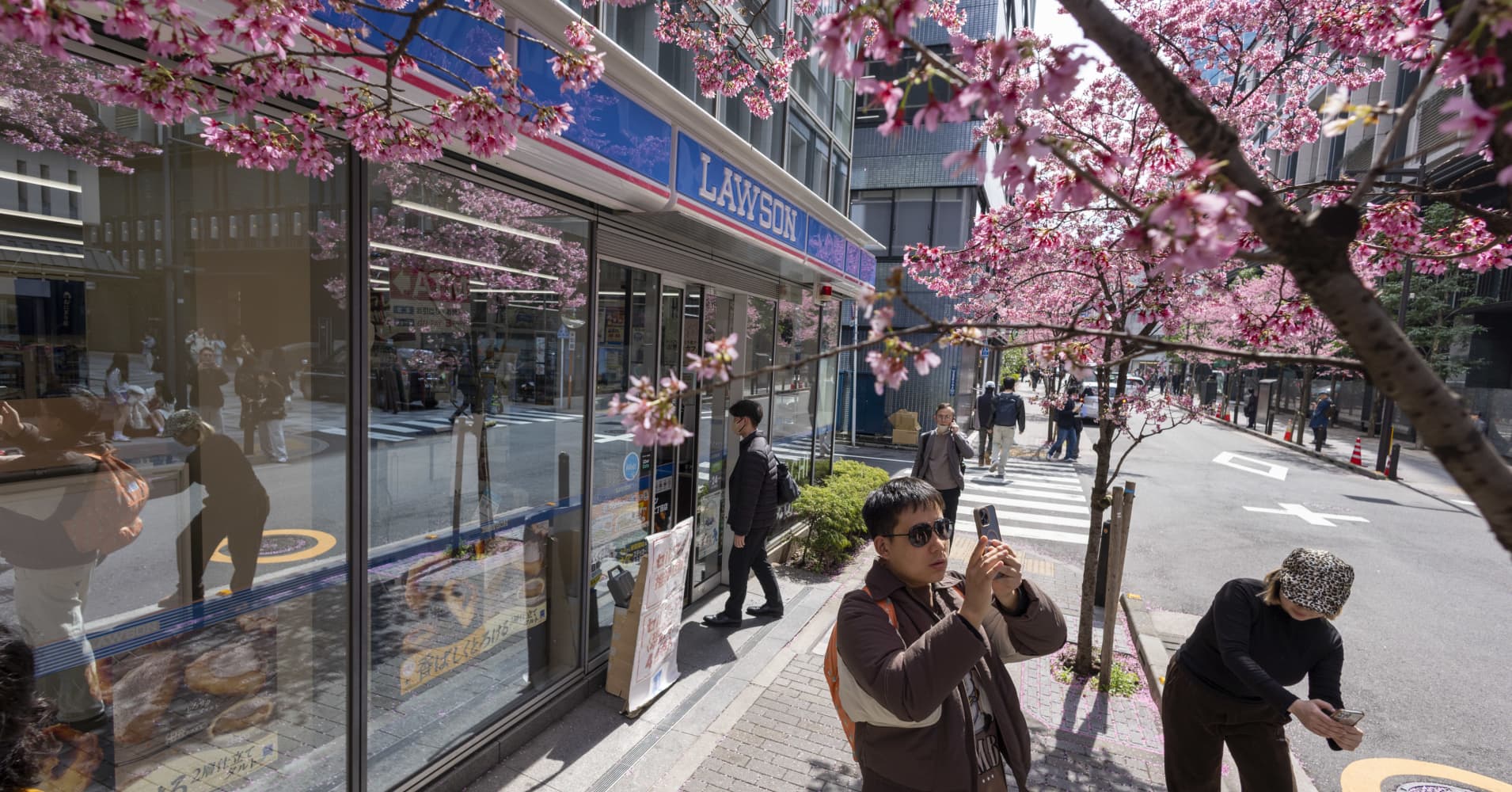Featured
- Get link
- X
- Other Apps
How a Stronger Yen Could Upend Japan’s Economy Driven by Foreign Visitors
- Half of Japan’s full-year GDP growth rate of 1.5% in 2023 was attributed to inbound tourism, as stated by the Mastercard Economics Institute. Additionally, this sector added 0.4 percentage points to Japan's 0.1% annual GDP growth for the previous year.
- The Japanese currency has been pinpointed as a significant factor contributing to the high number of tourists visiting the nation.
- However, given the Bank of Japan's efforts to increase interest rates, could this lead to a stronger yen that might deter tourists, thereby removing a crucial contributor to GDP growth in Japan?

In recent years, foreign visitors have significantly boosted Japan’s economy. Nonetheless, experts suggest this effect might diminish as the yen appreciates in value.
Tourists have been a key driver of the resurgence of the Japanese economy. Many have been attracted by weakness in the yen, which has made shopping, entertainment, transport and overnight stays cheaper.
What occurs should the trend reverse and the yen become stronger?
In recent times, travel expenditure in Japan has surged significantly. In fact, international visitors accounted for half of Japan’s total yearly GDP growth of 1.5% in 2023, and added 0.4 percentage points to Japan’s annual GDP growth of 0.1% the previous year, as reported by the Mastercard Economics Institute.
This represents a significant shift in the composition of the global economy’s fourth largest entity. During the period from 2010 to 2019, tourism added an average of 0.1 percentage points to the GDP, whereas Japan's GDP growth rate averaged around 1.2% during this same timeframe.
MEI's report showed that a weaker yen had made Japan a more appealing shopping destination. This is in stark contrast to other countries around the world, Mastercard's chief economist for Asia Pacific David Mann said, where tourists prefer to spend on experiences, such as going to a restaurant, concert or bar.
Japan has been one of Asia's hottest travel destinations of late. So much so that, according to Japan's tourism organization, the country saw A remarkable 36.9 million visitor arrivals were recorded. throughout the entire year of 2024.
In addition to this, tourists also increased their expenditure, with initial data indicating that the yearly spending by foreign visitors in Japan for 2024 hit a high point. all-time high of 8.1 trillion yen ($54.06 billion), representing a significant increase of 53.4% from the previous year.
The average expenditure per person for international visitors to Japan increased by 6.8%, reaching ¥227,000. Nevertheless, certain favorable circumstances that facilitated this surge in tourist enthusiasm might soon change direction.
Higher domestic inflation has prompted the Bank of Japan to raise interest rates, in contrast to other major central banks that are lowering rates. That, in turn, has triggered the yen to strengthen to a five-month high against the U.S. dollar on March 11.
Japan's booming tourism industry
Yujiro Goto, head of FX strategy for Japan at Nomura, told NewsBlogthat weaker inbound tourism would be a negative for Japan's GDP growth.
This is due to the yen's depreciation being one of the primary factors driving the surge in incoming tourism. Subsequently, a significant strengthening of the currency is anticipated to counteract this trend.
The yen recently traded at 148.26 versus the dollar, showing an appreciation of approximately 7.2% from its peak of 158.87 recorded earlier this year.
A small appreciation in the yen, which has been at historic lows, "like from 161 to 146 so far against the USD may not change the trend, in my view," Goto said.
Min Joo Kang, a senior economist focusing on Japan and South Korea at Dutch bank ING, agrees with this perspective but adds that international travel might continue expanding, considering that the influx of Chinese visitors hasn’t returned to prepandemic numbers yet.
The initiatives unveiled over the weekend aimed at increasing consumer spending also encompass promoting greater salary increases and invigorating China’s financial markets. This could lead to a rise in Chinese international travel,” she noted.
Beijing launched on Sunday A strategy aimed at increasing consumer spending, which includes initiatives to elevate wage levels along with “various steps” to maintain stability in the stock market, amongst other actions.
A slower pace of growth in tourism doesn’t automatically imply that Japan’s economic expansion will drastically decline. According to Mann from Mastercard, domestic consumption within Japan is anticipated to strengthen, thanks to a robust job market and rising salaries.

Japan’s biggest labor union declared last Friday that they successfully achieved an average 5.46% increase in wages Starting from April, this was its biggest rise in 34 years.
"So tourism may ease off, but then domestic consumption may take over as being a driver of growth," Mann said.
Should there be an appreciation of the Japanese yen, ING's Kang said it would have a more positive impact on the domestic economy, boosting private consumption and services.
Tourism management
Goto also said that gradual strength in the yen could slow cost-push inflation and would improve real wages among domestic residents. This would help shift the GDP contribution from foreign spending to domestic spending.
What's more, Goto said that while overtourism has become a major problem in regions like Kyoto, foreign demand is clearly supportive for wages and the inflation positive feedback loop that the BOJ wants to achieve.
He also pointed out that "regional governments may consider higher taxes for foreign visitors (hotels, airports, etc), which can support the Japanese fiscal situation while managing the tourism flows."
Mann finished his statement by noting that tourism has proven to be a much larger contributor than anticipated during the last couple of years, and he expects it "to continue playing a crucial role in Japan’s economy until it gradually slows down and is eventually superseded by somewhat more substantial impacts from internal consumer expenditure."
Mann noted that the depreciation of the yen might begin to reverse course within this year, though it will likely be an extended process rather than a quick shift happening over one or two months.
- Get link
- X
- Other Apps
Popular Posts
ABC Apologizes After Claudia Long Fabricates False Claims About Two High-Profile Politicians
- Get link
- X
- Other Apps
Oyetola Names Adeniran Aderogba New President/CEO of RMDB – Exclusive International Update
- Get link
- X
- Other Apps
Comments
Post a Comment